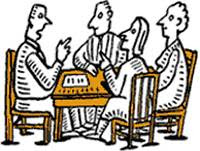Ah, John 9, one of my favourite chapters! First I'm going to explain about the so-called Messianic Miracles, then you'll see why I like the chapter.
The rabbis in Yahshua's day had constructed a lot of rules which were designed to ring-fence the Law.
 Although miracles were not unknown in Israel, the Pharisees had specified three Messianic Miracles that nobody but the Messiah would be able to perform. These were healing a Jewish leper, casting out a dumb demon, and healing someone blind from birth. If someone performed these miracles there was a specified procedure for checking if he was the Messiah. First he must be observed at work, then he must be interrogated. Remember, none of this is in the Law given by Moses, it's just rabbinic teaching accumulated over the centuries.
Although miracles were not unknown in Israel, the Pharisees had specified three Messianic Miracles that nobody but the Messiah would be able to perform. These were healing a Jewish leper, casting out a dumb demon, and healing someone blind from birth. If someone performed these miracles there was a specified procedure for checking if he was the Messiah. First he must be observed at work, then he must be interrogated. Remember, none of this is in the Law given by Moses, it's just rabbinic teaching accumulated over the centuries.Notice in verse 1 how Yahshua and the disciples see this man, blind from birth. Perhaps they had a conversation with him or with people who knew him. They had a discussion about the case after the disciples asked why the man was blind. And then the Lord made mud and put it on the blind man's eyes (which would have counted as working on Shabbat according to rabbinic tradition) and told him to go and wash.
Do you see how, in verses 8 to 12, the people who knew the man and his history want to know how he could now see? This was a Messianic Miracle and they knew it! And in verse 13 they take the man to the Pharisees who can't agree amongst themselves over this extraordinary event. They quizzed the man, they quizzed his parents, then they quizzed the man again and got more than they bargained for! (verses 30-33)
What they would have done next would be to observe Yahshua very carefully for a while, and then interrogate him. This is not the only Messianic Miracle he performed, he did all three. Notice that later, Yahshua himself pointed to the miracles when he says, 'The miracles I do in my Father's name speak for me.' (John 10:25) And he mentions the miracles again in John 10:32 and 38.
Now can you see why I love this passage? It has hidden within it things that would have been obvious to Greek or Aramaic speaking Jews in Jesus day. These are some of the things Saul would have taught before he became Paul on the Damascus Road and they are details that speak loudly to modern Jews about the veracity of the gospel accounts as historical documents.
< John 8 | Index | John 10 >






